The Hypogonadism Treatment Market is estimated to be valued at USD 4.2 billion in 2025 and is projected to reach USD 6.8 billion by 2035, registering a compound annual growth rate (CAGR) of 5.0% over the forecast period.
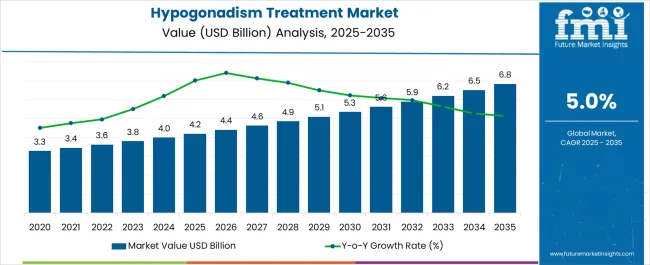
| Metric | Value |
|---|---|
| Hypogonadism Treatment Market Estimated Value in (2025 E) | USD 4.2 billion |
| Hypogonadism Treatment Market Forecast Value in (2035 F) | USD 6.8 billion |
| Forecast CAGR (2025 to 2035) | 5.0% |
The hypogonadism treatment market is experiencing consistent growth, driven by the rising prevalence of hormonal disorders and the increasing recognition of hypogonadism in both aging populations and younger individuals with genetic or acquired conditions. Growing awareness about the clinical consequences of low testosterone levels, including metabolic complications, infertility, and reduced quality of life, is contributing to the sustained demand for treatment options. Healthcare providers are placing stronger emphasis on timely diagnosis, supported by advancements in diagnostic testing and biomarker analysis, which is improving patient identification rates.
The availability of diverse therapeutic modalities, including hormone replacement therapies and novel drug delivery mechanisms, is expanding access for patients and improving adherence. Additionally, increasing healthcare spending, supportive reimbursement frameworks in several regions, and ongoing research into long-acting formulations are influencing treatment adoption.
The growing preference for personalized therapies and improved safety profiles in treatment protocols is expected to support continued expansion of the market As awareness programs expand and treatment pathways become more streamlined, the market is positioned for long-term growth globally.
The hypogonadism treatment market is segmented by product type, distribution channel, and geographic regions. By product type, hypogonadism treatment market is divided into Testosterone Replacement Therapy, Injection, Patch, Gel, Lozenge, Estrogen Therapy, and Progesterone Therapy. In terms of distribution channel, hypogonadism treatment market is classified into Hospitals including hospital pharmacies, Clinics, and Retail pharmacies. Regionally, the hypogonadism treatment industry is classified into North America, Latin America, Western Europe, Eastern Europe, Balkan & Baltic Countries, Russia & Belarus, Central Asia, East Asia, South Asia & Pacific, and the Middle East & Africa.
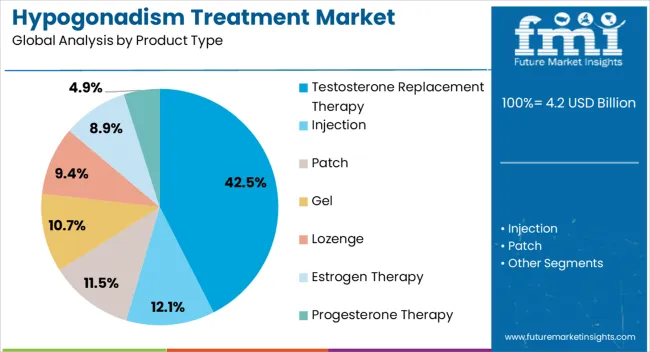
The testosterone replacement therapy segment is projected to hold 42.5% of the hypogonadism treatment market revenue share in 2025, establishing it as the leading product type. This dominance is being supported by the proven efficacy of testosterone replacement in restoring hormonal balance, alleviating symptoms such as fatigue, decreased libido, and reduced muscle mass, and improving overall quality of life in patients. The availability of multiple formulations, including injectables, transdermal patches, gels, and oral capsules, is providing flexibility for clinicians and patients, ensuring higher compliance rates.
Advancements in delivery technologies have contributed to the development of long-acting formulations, which minimize dosing frequency and improve treatment adherence. Safety monitoring practices and regulatory oversight are also ensuring that therapies maintain a favorable benefit-risk profile, thereby enhancing confidence among prescribing physicians.
The segment’s growth is further strengthened by rising awareness campaigns, increased screening for testosterone deficiency, and growing acceptance of hormone replacement in both primary and specialty care settings As clinical guidelines continue to endorse testosterone therapy as a standard treatment for hypogonadism, its leading position in the market is expected to be reinforced.
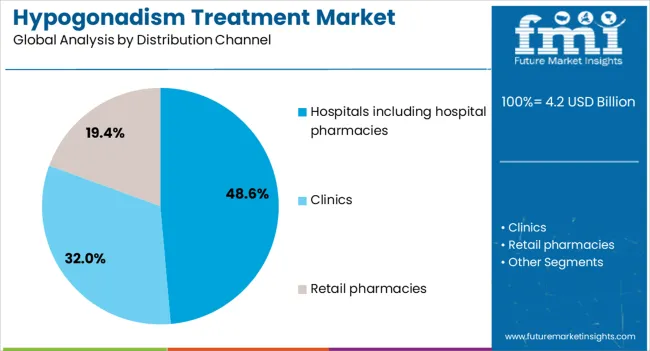
The hospitals including hospital pharmacies distribution channel segment is expected to account for 48.6% of the hypogonadism treatment market revenue share in 2025, making it the dominant channel. This leadership is being driven by the critical role hospitals play in diagnosis, treatment initiation, and ongoing monitoring of patients with hypogonadism. Hospitals often serve as the primary point of care for patients presenting with hormonal imbalances, ensuring timely access to specialized endocrinology services.
The availability of advanced diagnostic facilities and trained medical professionals enhances treatment accuracy, while in-hospital pharmacies provide immediate access to prescribed therapies, improving adherence. Hospitals are also preferred for the administration of injectable testosterone formulations, which require professional supervision for safe delivery. The integration of hospital pharmacies into patient care pathways ensures continuity of treatment, reducing the likelihood of missed doses and improving outcomes.
Furthermore, the growth of large multispecialty hospitals and increasing investment in healthcare infrastructure are expanding the reach of this channel With a strong emphasis on patient safety, treatment monitoring, and streamlined therapy distribution, hospitals and their pharmacies are expected to remain the leading distribution avenue in the global hypogonadism treatment market.
Key providers of hypogonadism treatment have been involved in successful product launches that are generating opportunities for testosterone production complications. For instance, a key market player announced that their recently launched clear, odorless testosterone gel formulation, “AndroGel 1.62%,” which restores testosterone levels in hypogonadal men, has been approved by the USA Food and Drug Administration (FDA). The key player claims that this product has half the volume of gel at the starting dose compared to its prequel, AndroGel 1%. Both the gel formulations are prescription medications used to treat adult males with low or no testosterone. These factors are estimated to drive the demand for hypogonadism treatment.
In the United States, nearly 14 Mn men may have low testosterone levels. Moreover, the Endocrine Society noted that the normal range for testosterone is 300-1,000 ng/dL and has developed guidelines for the diagnosis and treatment of hypogonadism. This particular gel has been used by physicians and patients for more than a decade and is a revered innovation to treat the condition. Other testosterone solutions have also been launched by key players who have entered into an exclusive worldwide license agreement for their potential commercialization, which supports global hypogonadism treatment market growth. However, the drug applications of some of these solutions are still under regulatory review by the USA Food and Drug Administration (FDA).
The market players are focused on developing a growing portfolio of pharmaceutical products by applying the latest research from their own worldwide laboratories and forming collaborations with eminent scientific organizations. Furthermore, they strive to provide answers, through medicines and information, to the families of patients for some of the world's most urgent medical needs. Hence, this leads to the high adoption of hypogonadism treatment. They claim that their research and development (R&D) pipeline includes 81 clinical-stage projects, 31 of which are in phase 3 or have been submitted to regulatory authorities for approval. These projects are made possible by people who volunteer to participate in a clinical trial, some of which are new molecular entities while others are existing products with potential new indications. These factors are likely to expand the global hypogonadism treatment market size.
Lack of sex hormones can lead to other complaints like increased risk of heart disease and osteoporosis, due to thinning of bones. This has led to the growth of hypogonadism treatment market. Moreover, the market has presence of patented brands with huge sales. Hypogonadism incidence will rise with increasing age and increasing incidence of obesity and rheumatoid arthritis.
In addition, changing lifestyle habits associated with smoking and increasing stress levels also lead to reduced androgen and estrogen levels. These are some of the driving force for hypogonadism treatment market. However, the entry of generics would lead to sales erosion of the top brands in the market, thus restraining the hypogonadism treatment market to grow to certain extent.
The treatment modality for hypogonadism mainly incudes testosterone replacement through exogenous administration. However, for spermatogenesis, gonadotropins are preferred as testosterone is identified to be less effective. In females, estrogen and progesterone hormones are replaced by exogenous administration.
Therefore, the market is analyzed based on hormonal replacement therapy as testosterone, gonadotropins, estrogen and progesterone. Pre-menopausal women can benefit from estrogen that comes in pill or patch form. Treatment for males and females is similar if the hypogonadism is due to a tumor on the pituitary gland. Treatment may include radiation, medication or surgery to shrink or remove the tumor.
Region wise, the global hypogonadism treatment marketis classified into regions namely, North America, Latin America, Western Europe, Eastern Europe, Asia-Pacific, Japan, Middle East and Africa. North America is the largest market for hypogonadism treatment with the presence of high prevalence of the disease. However, the industry will be experiencing higher demand from the developing regions such as Latin America, Asia-Pacific, Middle-East and Africa.
The report is a compilation of first-hand information, qualitative and quantitative assessment by industry analysts, inputs from industry experts and industry participants across the value chain. The report provides in-depth analysis of parent market trends, macro-economic indicators and governing factors along with market attractiveness as per segments. The report also maps the qualitative impact of various market factors on market segments and geographies.
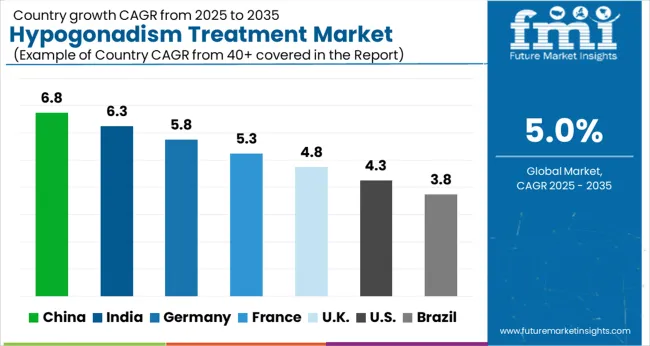
| Country | CAGR |
|---|---|
| China | 6.8% |
| India | 6.3% |
| Germany | 5.8% |
| France | 5.3% |
| UK | 4.8% |
| USA | 4.3% |
| Brazil | 3.8% |
The Hypogonadism Treatment Market is expected to register a CAGR of 5.0% during the forecast period, exhibiting varied country level momentum. China leads with the highest CAGR of 6.8%, followed by India at 6.3%. Developed markets such as Germany, France, and the UK continue to expand steadily, while the USA is likely to grow at consistent rates. Brazil posts the lowest CAGR at 3.8%, yet still underscores a broadly positive trajectory for the global Hypogonadism Treatment Market. In 2024, Germany held a dominant revenue in the Western Europe market and is expected to grow with a CAGR of 5.8%. The USA Hypogonadism Treatment Market is estimated to be valued at USD 1.4 billion in 2025 and is anticipated to reach a valuation of USD 2.2 billion by 2035. Sales are projected to rise at a CAGR of 4.3% over the forecast period between 2025 and 2035. While Japan and South Korea markets are estimated to be valued at USD 196.4 million and USD 130.7 million respectively in 2025.
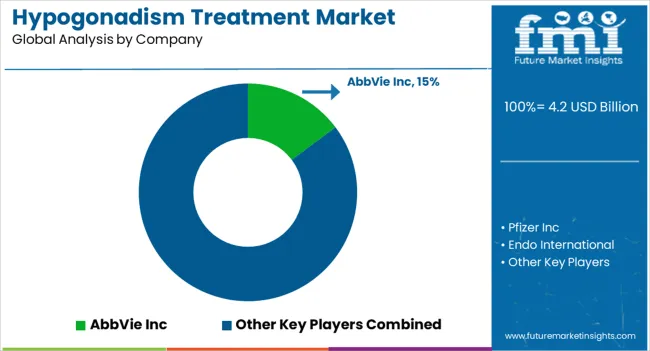
| Item | Value |
|---|---|
| Quantitative Units | USD 4.2 Billion |
| Product Type | Testosterone Replacement Therapy, Injection, Patch, Gel, Lozenge, Estrogen Therapy, and Progesterone Therapy |
| Distribution Channel | Hospitals including hospital pharmacies, Clinics, and Retail pharmacies |
| Regions Covered | North America, Europe, Asia-Pacific, Latin America, Middle East & Africa |
| Country Covered | United States, Canada, Germany, France, United Kingdom, China, Japan, India, Brazil, South Africa |
| Key Companies Profiled | AbbVie Inc, Pfizer Inc, Endo International, Eli Lilly, Bayer, Ferring Pharmaceuticals, Merck KGaA (Serono), Teva, Viatris (Mylan), Clarus Therapeutics, Acerus Pharma, and Besins Healthcare |
The global hypogonadism treatment market is estimated to be valued at USD 4.2 billion in 2025.
The market size for the hypogonadism treatment market is projected to reach USD 6.8 billion by 2035.
The hypogonadism treatment market is expected to grow at a 5.0% CAGR between 2025 and 2035.
The key product types in hypogonadism treatment market are testosterone replacement therapy, injection, patch, gel, lozenge, estrogen therapy and progesterone therapy.
In terms of distribution channel, hospitals including hospital pharmacies segment to command 48.6% share in the hypogonadism treatment market in 2025.






Full Research Suite comprises of:
Market outlook & trends analysis
Interviews & case studies
Strategic recommendations
Vendor profiles & capabilities analysis
5-year forecasts
8 regions and 60+ country-level data splits
Market segment data splits
12 months of continuous data updates
DELIVERED AS:
PDF EXCEL ONLINE
Treatment-Resistant Hypertension Management Market Size and Share Forecast Outlook 2025 to 2035
Treatment-Resistant Depression Treatment Market Size and Share Forecast Outlook 2025 to 2035
Treatment Pumps Market Insights Growth & Demand Forecast 2025 to 2035
Pretreatment Coatings Market Size and Share Forecast Outlook 2025 to 2035
Air Treatment Ozone Generator Market Size and Share Forecast Outlook 2025 to 2035
CNS Treatment and Therapy Market Insights - Trends & Growth Forecast 2025 to 2035
Seed Treatment Materials Market Size and Share Forecast Outlook 2025 to 2035
Acne Treatment Solutions Market Size and Share Forecast Outlook 2025 to 2035
Scar Treatment Market Overview - Growth & Demand Forecast 2025 to 2035
Soil Treatment Chemicals Market
Water Treatment Market Size and Share Forecast Outlook 2025 to 2035
Water Treatment Ozone Generator Market Size and Share Forecast Outlook 2025 to 2035
Water Treatment Equipment Market Size and Share Forecast Outlook 2025 to 2035
Burns Treatment Market Overview – Growth, Demand & Forecast 2025 to 2035
CRBSI Treatment Market Insights - Growth, Trends & Forecast 2025 to 2035
Water Treatment Polymers Market Growth & Demand 2025 to 2035
Water Treatment System Market Growth - Trends & Forecast 2025 to 2035
Algae Treatment Chemical Market Growth – Trends & Forecast 2024-2034
Water Treatment Chemical Market Growth – Trends & Forecast 2024-2034
Anemia Treatment Market Analysis - Growth & Forecast 2025 to 2035

Thank you!
You will receive an email from our Business Development Manager. Please be sure to check your SPAM/JUNK folder too.
Chat With
MaRIA